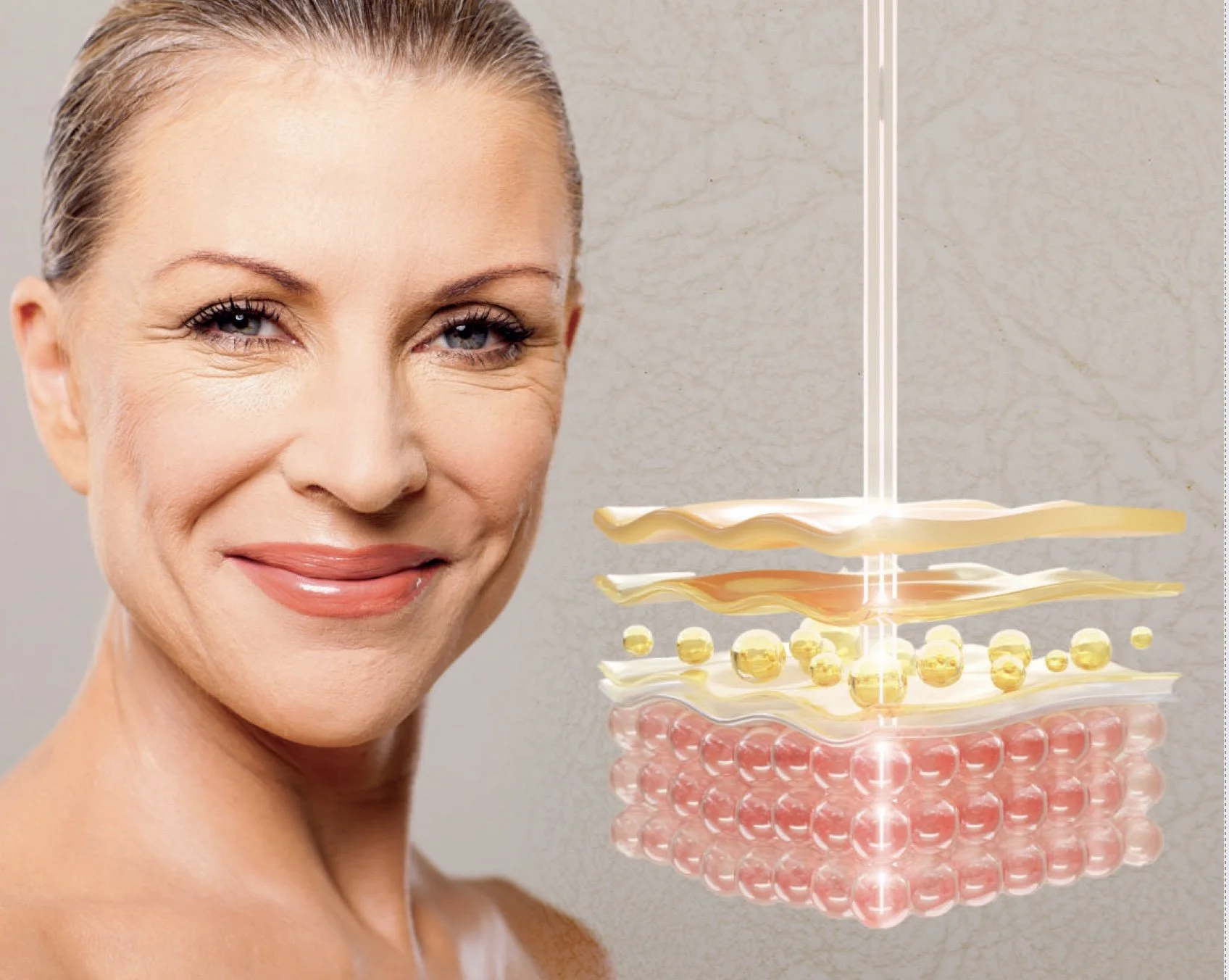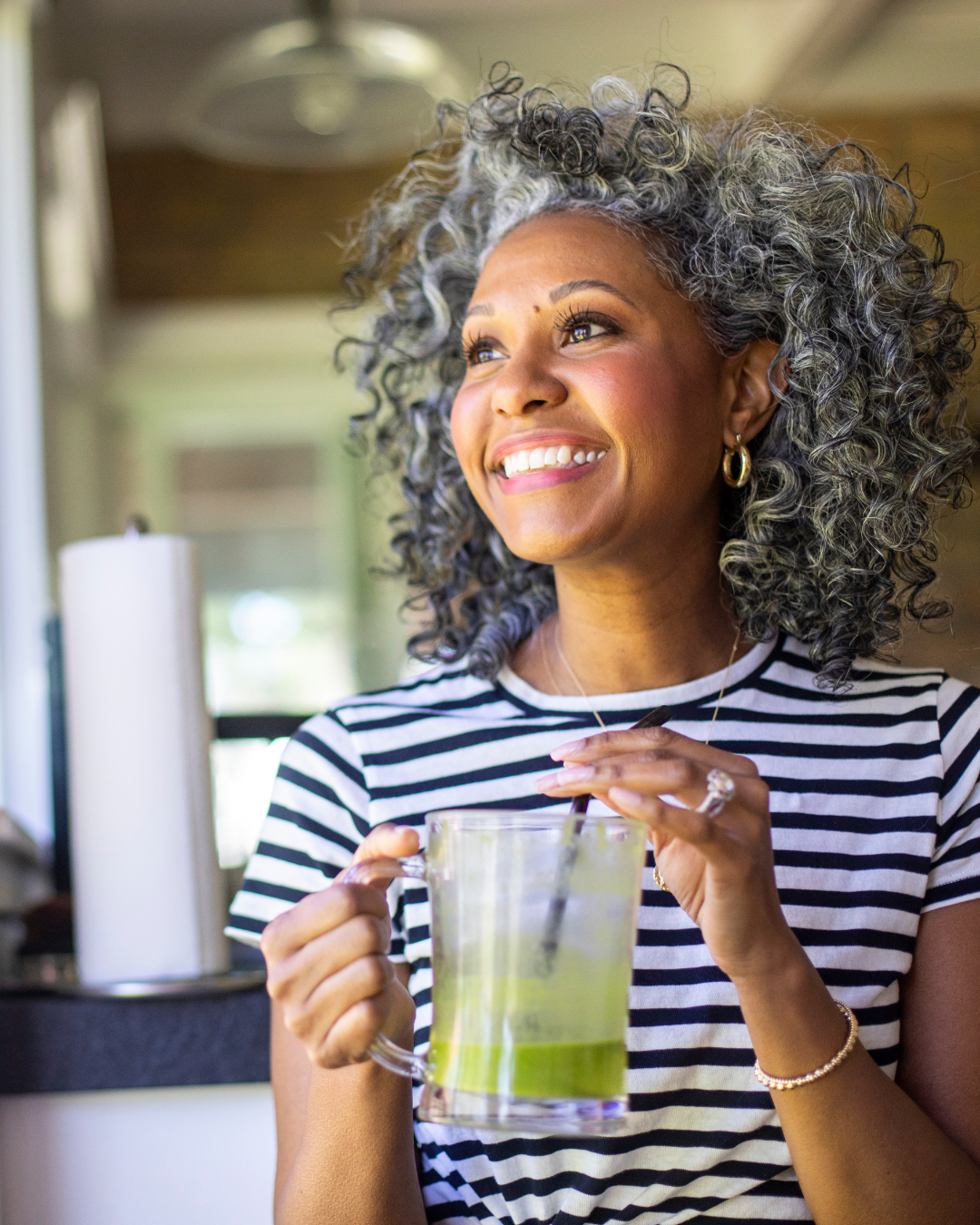A Trichology Perspective on Aging Hair and Collagen
Photo credit to QIMA Life Sciences
When most people think about aging, they think about the skin, joints, and even memory. But our hair ages too—and that goes beyond just graying hair and pigmentation changes. The changes we experience in our hair and scalp as we age are often a reflection of internal processes we don’t immediately associate with hair health. As a certified trichologist, I’ve spent years helping clients understand the science behind their hair concerns, and aging hair is one of the most common (and misunderstood) challenges I see.
If you’re experiencing thinning, dryness, slower growth, or increased shedding, know that these changes are not random—they’re part of a broader biological shift. But that doesn’t mean they’re inevitable or irreversible. With the right knowledge and tools, you can support your hair and scalp through the aging process—starting with collagen.
What Happens to Hair As We Age?
Hair aging starts earlier than most people realize. In our late 20s to early 30s, the systems that keep our hair full and strong—like hormone balance, collagen production, and cellular energy—begin to slow down. By the time we reach midlife, these shifts are more noticeable: hair may feel drier or thinner, growth may slow, and the scalp can become more visible.
Several key factors contribute to these changes:
Hormonal changes: A natural drop in estrogen and progesterone—particularly during perimenopause and menopause—shortens the hair's growth cycle and increases the rate of shedding. Many women also notice thinning at the crown or part line. (Learn more about how your hormones affect your hair and scalp health.)
Medication: Some commonly prescribed medications, including antidepressants, blood pressure drugs, and hormonal therapies, can trigger hair thinning. If you notice a change, talk to your provider to explore alternatives.
Stress: Prolonged stress raises cortisol, which can negatively impact the scalp’s environment and disrupt the normal hair cycle. It’s also linked to conditions like telogen effluvium, where hair sheds more rapidly.
Nutrition: As we age, nutrient absorption becomes less efficient. Hair follicles need consistent nourishment from protein, iron, healthy fats, and vitamins to stay strong and in a prolonged growing phase. (Learn more about how nutritional wellness impacts your hair and scalp health.)
These factors impact not just your strands but also the scalp microbiome that supports them—the scalp, the follicles, and the hair cycle itself. That’s why addressing aging hair means looking deeper than surface-level treatments.
How Does Collagen Play a Role in Hair & Scalp Health?
Collagen is the body’s most abundant protein, and it’s foundational to skin, joint, and connective tissue health. In the context of hair, collagen helps maintain the scalp's structure and supports the hair follicle’s integrity. This makes it a key player in the longevity and vitality of your hair.
As collagen production decreases with age, the scalp becomes thinner and less elastic. The follicle’s foundation weakens, circulation may diminish, and the skin may become drier and more prone to irritation—all of which impact hair quality and growth.
Here’s how collagen supports the hair and scalp system:
Anchors the follicle: Collagen stabilizes the dermis, where the follicle lives, helping to keep it firmly rooted.
Improves circulation: Healthy collagen supports strong capillaries, which supply the follicle with oxygen and nutrients.
Feeds growth: Collagen breaks down into amino acids like proline and glycine, essential for building keratin, the primary protein in hair. (Learn more about keratin’s role in hair and scalp care.)
Protects the scalp: It helps maintain elasticity, hydration, and barrier function, preventing flakiness or inflammation.
Aids repair: When the scalp experiences damage—from stress, heat, or environmental exposure—collagen contributes to healing and regeneration.
Without adequate collagen, the scalp environment becomes less supportive of healthy hair growth. That’s why one of the most effective ways to manage aging hair is to strengthen and protect the structures that support it.
How to Support Aging Hair & Collagen Loss?
You can’t stop the aging process, but you can take targeted action to slow down its effects on your hair. Supporting collagen and scalp health is about consistency, not perfection. A combination of nutrition, lifestyle, and topical care makes the biggest impact.
Here are effective ways to support collagen and keep hair resilient:
Incorporate collagen-rich foods: Foods like bone broth, fish, and chicken skin are also rich in amino acids that support collagen production.
Boost vitamin C: Vitamin C is essential for collagen synthesis. Without it, your body can’t build or maintain collagen. Include citrus fruits, berries, bell peppers, and leafy greens in your diet.
Eat enough protein: Amino acids are the building blocks of both collagen and keratin. Make sure your meals include eggs, fish, legumes, nuts, or lean meat.
Take targeted supplements: I often recommend Viviscal or Tricoextra, which are formulated specifically to support hair and scalp health with nutrients like biotin, zinc, iron, and marine collagen.
Reduce stress: Chronic stress is a major collagen depleter. Make rest, movement, and boundaries part of your hair care strategy.
Be gentle with your hair and scalp: Harsh products, tight hairstyles, and excessive heat styling can all damage the follicle and accelerate collagen breakdown. Prioritize clean, nourishing scalp care.
Supporting collagen is not just about adding one product or vitamin. It’s about making consistent, supportive choices that help your scalp stay strong—and your hair stay fuller, longer.
A Trichologist-Approved Product: Oribe Serene Scalp Densifying Regimen
I’m proud to have partnered with Oribe Hair Care to co-create the Serene Scalp Densifying Collection. This three-step regimen was designed to bring scalp health and luxury together—and to help clients achieve denser, fuller-looking hair.
What makes this line so beneficial is its ability to support the scalp's natural environment while targeting early signs of thinning. Each formula was carefully developed to nourish the follicle, enhance circulation, and create the conditions for stronger hair to grow.
Key ingredients include:
Capixyl: A biomimetic peptide that supports follicle health and helps extend the hair’s growth phase.
Redensyl: Revitalizes follicular stem cells to support hair density and strength.
Pea Sprout Extract: Known to strengthen fragile strands and improve overall hair vitality.
The shampoo gently cleanses without disrupting the scalp’s natural barrier. The conditioner delivers moisture and reinforcement without weighing down the hair. And the densifying spray targets thinning areas and boosts scalp resilience over time. This collection is ideal for anyone experiencing hair that feels less full, more fragile, or fatigued. It’s a luxury experience rooted in science—and a daily ritual that helps you take better care of your scalp and strands.
Can You See a Trichologist for Hair Aging and Collagen Loss?
If you’ve noticed changes in your hair’s texture, density, or behavior, a trichologist can help you understand why.
Some signs you should seek a trichologist’s support include:
A scalp that feels irritated, painful, or inflamed
Increased shedding or thinner ponytails
Hair that doesn’t respond to your usual routine
Persistent dryness, flaking, or oiliness
As a trichologist, I take a full-picture approach to understanding what’s happening with your hair and scalp. Here are a few of the key ways I help:
Scalp analysis using a dermatoscope to examine hair density, inflammation, buildup, and follicle health up close
Reviewing your most recent blood work to help identify internal imbalances or nutritional deficiencies
Assessing your diet and lifestyle to ensure your body is getting the right support for healthy hair growth
Evaluating your hair care and styling routines to identify habits that may be contributing to breakage, thinning, or scalp stress (learn more about my trichology-approved hair care and styling tips).
This comprehensive approach helps us get to the root of your concerns and develop an individualized plan that works for your lifestyle. Whether it's in-office treatments (learn more about my recommendations for scalp treatments as a trichologist), at-home scalp care, dietary shifts, or simple self-care practices, the goal is to create a manageable routine that empowers you to support your hair and scalp from the inside out.
The Bottom Line on Aging Hair: Science, Support, and Self-Care
Aging is a natural process, but how we care for ourselves—and our hair—can influence how it unfolds. With professional support, the right products, and a deeper understanding of your follicles, you can keep your hair strong, full, and thriving well into the years ahead.
If you’re ready to take control of your hair health, I encourage you to book a consultation. Together, we’ll assess your scalp, explore treatment options, and build a plan that meets you where you are.
Copyright 2025 © Penny James Trichology Center





